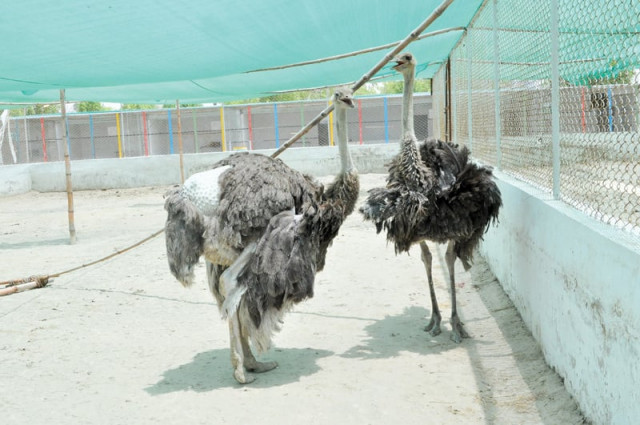A cagey affair: The Hyderabad zoo lacks funding, and its animals suffer for it
Gate receipts have been declining steadily and the zoo has no electricity for five months.

“I have been bringing my son here almost every month for the past six months,” claims Ahmed Nazir, Hunain’s father. “He likes the coloured parrots and the ostriches.”

The condition of the animals, however, has been gradually deteriorating during this time. “Perhaps it is due to the unnatural habitat in the enclosures, or maybe it is some other reason that makes the animals uncomfortable,” said Nazir, a trader by profession.
In shambles
His untrained opinion is not far from that of veterinarians, as the zoo has been in constant decline. Standard zoo protocol requires providing adequate food, water and space for the animals and the purpose of a zoo is to provide entertainment to the people, along with conserving endangered species and providing a place for research and education. The Rani Baagh, however, seems to be providing little in terms of entertainment and attraction, and even less in terms of helping the animals.
The enclosures come in two sizes; the smaller ones house the monkeys, the wolves, the birds and a fox, while the deer, goats, peacocks, crocodiles, zebra, llama, ostrich and a pony horse are kept in the larger ones. The zoo once housed a lioness, brought during the November 2008 inauguration after its renovation, but she died after a year. In many of the enclosures, animals are exposed to sunlight for prolonged periods of the day as the shabby cloth covering the roof of the fence has been torn apart.
“Popular animals such as lions, tigers, elephants, bears and pythons are missing from the Rani Baagh,” said Jamaluddin, who has been working at the zoo for 16 years.
Jamaluddin stands guard at the zoo’s gate and from this vantage point, he has seen the number of visitors dwindle steadily over the years. Daily income from the gate passes - Rs10 per person - has fallen from Rs2,000 to a mere Rs1,200 on weekdays. Weekends, however, still fetch somewhere between Rs8,000 to Rs10,000.
Lack of finances
“The contractor who buys food for the animals has not been paid for several months,” reveals a zoo staff member. “Therefore, he no longer brings enough food as his monthly bill is a significant amount, usually between Rs400,000 and Rs450,000. There is just 10 kilogramme of beef daily for four crocodiles, six foxes and a wolf.”
Due to non-payment of electricity bills, the zoo’s electricity was cut off five months back and is yet to be restored.
The Rani Baagh comes under the municipal administration of Qasimabad and zoo officials are refreshingly honest in accepting its shortcomings, in terms of the number of animals and the way that they are kept.

“There is no fixed budget for the zoo. We can’t even afford to pay salaries or buy medicine for the animals,” says Ali Raza Shoro, a grade 14 staff, who has been made the acting incharge, a grade 17 post.
He claims that since assuming charge, he has written multiple letters to the chief minister and the local government secretary to approve financial grants for the purchase of animals.
Shoro, who shows a keen interest in the animals but lacks the qualification and the experience required, says he wants to buy a pair each of lions, elephants and bears, as well as companions for the solitary pony horse, zebra, llama and ostrich. “There are 30 goats here that I want to sell so that I can raise funds to buy other animals. But, I don’t have the permission to do so.”

Through its gate pass contract, the zoo makes over Rs3 million annually, according to Qasimabad Municipal Committee’s administrator Hatim Mallah. “This amount is considerably less as compared to what we have to spend on food alone,” he claims. The total revenue generated by the Rani Baagh is around Rs13 million per year thanks to its other attractions, he adds. Mallah, like Shoro, also claims that he has written several times to the provincial government, but to no avail.
The zoo functions without a full time vet
The zoo also lacks a full time vet since former vet and zoo incharge, Arif Jahejo, was promoted to another position more than a year ago. Dr Ghulam Shah Jeelani, an employee of Animal Husbandry, whose area of expertise is limited to domestic animals, told The Express Tribune that he has been temporarily fulfilling the duty for the past year. “I have been directed to spend an hour or two daily at the zoo, in addition to responding to emergencies. But, the zoo needs a permanent vet for the animals.”
He claims that the department does not pay him for this additional duty. Three animals, including a male ostrich and a deer, recently died of paralyses within a week. The vet claims that they were given medical treatment during the last two or three days of their lives but could not survive.
Experts, former employees unhappy
Dr Ali Murtaza Dharejo, a zoology professor at the Sindh University, says most of the zoos in Pakistan will be shut down if animal welfare laws are enforced. “It is better to convert the Rani Baagh into an amusement park than to keep on gradually killing the caged animals,” he says.
He complains about zoo’s management. A manifestation of this can be seen in the way its inchrage, Ali Raza Shoro, posed for a photograph with the flayed hide of the dead ostrich.
“I gave it as a gift to a friend so that he can display it,” Shoro admitted while talking to The Express Tribune.
Riaz Khan, a municipal employee who worked at the zoo for three years in the late 80s and early 90s, finds many oddities when he looks back at his time at the zoo. “Monkeys were kept in bird cages, over two dozen goats were cramped into two separate enclosures and there were over half a dozen enclosures filled with nothing but the common deer,”
he said.
Published in The Express Tribune, July 7th, 2014.



















COMMENTS
Comments are moderated and generally will be posted if they are on-topic and not abusive.
For more information, please see our Comments FAQ